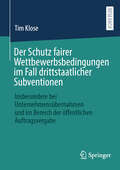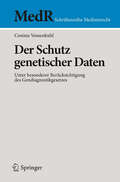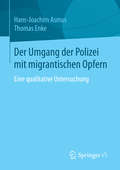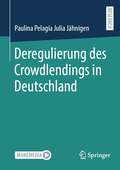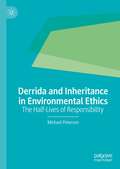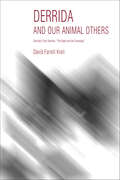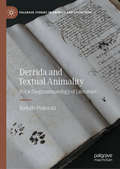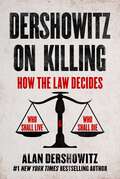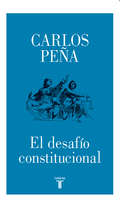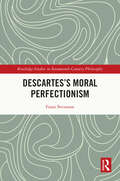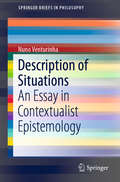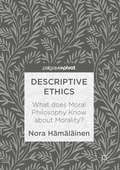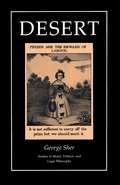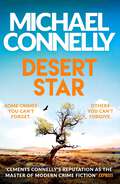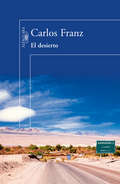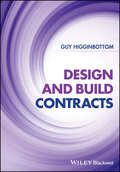- Table View
- List View
Der Rechtsstaat als Geflecht von Erwartungen: Eine neue Sicht auf Wirtschaft und Recht für eine gerechtere Zukunft
by Kaushik BasuIn diesem Buch argumentiert Kaushik Basu, einer der weltweit führenden Wirtschaftswissenschaftler, dass die traditionelle ökonomische Analyse des Rechts erhebliche Mängel aufweist und bestimmte kritische Fragen nicht zufriedenstellend beantworten kann. Warum werden gute Gesetze formuliert, aber nie umgesetzt? Wenn Gesetze nicht durchgesetzt werden, ist das dann ein Versagen des Gesetzes oder der Vollstrecker? Und, was am wichtigsten ist, wenn man bedenkt, dass Gesetze nur Worte auf dem Papier sind, warum sind sie dann wirksam? Basu bietet eine provokante Alternative, wie die Beziehung zwischen Wirtschaft und realer Rechtsdurchsetzung verstanden werden kann.Basu fasst die neoklassische Rechts- und Wirtschaftswissenschaft zusammen, bevor er sich mit den Schwächen dieser Disziplin befasst. Mit Hilfe der modernen Spieltheorie entwickelt er einen "Brennpunkt"-Ansatz, der nicht nur die eigennützigen Handlungen der Bürger modelliert, die Gesetze befolgen müssen, sondern auch die Funktionäre des Staates - Politiker, Richter und Bürokraten -, die diese Gesetze durchsetzen. Er veranschaulicht die Zusammenhänge zwischen sozialen Normen und dem Gesetz und zeigt, wie gut durchdachte Ideen das menschliche Verhalten verändern und fördern können. Zum Beispiel werden sich Geber und Nehmer von Bestechungsgeldern zusammentun, wenn sie vor dem Gesetz gleich behandelt werden. Und bei Nahrungsmittelhilfeprogrammen sollten Gutscheine direkt an die Armen ausgegeben werden, um zu verhindern, dass Ladenbesitzer subventionierte Rationen auf dem freien Markt verkaufen. Basu liefert ein neues Paradigma für das Zusammenspiel von Recht und Wirtschaft - ein Rahmen, der sowohl für weniger entwickelte Länder als auch für die entwickelte Welt gilt."Der Rechtsstaat als Geflecht von Erwartungen" zeigt die Grenzen und Möglichkeiten von Recht und Wirtschaft auf und schlägt eine neue Denkweise vor, die wirksamere Gesetze und eine gerechtere Gesellschaft ermöglichen wird.
Der Schutz des Individuums durch das Recht: Festschrift für Rainer Hofmann zum 70. Geburtstag
by Philipp B. Donath Alexander Heger Moritz Malkmus Orhan BayrakIn dieser Festschrift für Prof. Dr. Dr. Rainer Hofmann anlässlich seines 70. Geburtstags würdigen langjährige Kolleginnen und Kollegen sowie Schülerinnen und Schüler das vielfältige und umfassende Wirken des Jubilars in unterschiedlichen Rechtsgebieten, welches sich insgesamt durch einen besonderen Fokus auf den Schutz des Individuums durch das Recht auszeichnet.Die Beitragenden aus Wissenschaft und Praxis befassen sich mit ausgewählten Themen aus den zentralen Arbeitsfeldern von Rainer Hofmann, in denen er die Rechtsentwicklung durch seine beachtliche Forschung und einflussreiche Tätigkeit in nationalen und internationalen Gremien entscheidend geprägt hat.Vor diesem Hintergrund werden in dieser Festschrift unter anderem folgende Rechtsbereiche behandelt: Allgemeines Völkerrecht, Menschenrechte und Minderheitenschutz, humanitäres Völkerrecht, Wirtschaftsvölkerrecht, einschließlich Investitionsschutz, Europarecht und Verfassungsrecht.
Der Schutz fairer Wettbewerbsbedingungen im Fall drittstaatlicher Subventionen: Insbesondere bei Unternehmensübernahmen und im Bereich der öffentlichen Auftragsvergabe
by Tim KloseDen EU-Binnenmarkt zu schützen ist fundamentale Grundvoraussetzung für die Existenz und den Fortbestand der Europäischen Union. Im Lichte dessen wurde am 14. Dezember 2022 die VO 2560/2022 zur Regulierung verzerrender drittstaatlicher Subventionen auf dem EU-Binnenmarkt erlassen. Sie trat im Januar 2023 in Kraft. Das neue Regelungsregime ist dabei ein Novum; überwindet es bisherige klassische dogmatische Grenzen auf EU-Ebene, verbindet klassisch kartellrechtliche Elemente, Elemente des EU-Beihilferechts, des EU-Vergaberechts und des EU-Außenwirtschaftsrechts mit dem Ziel, den EU-Binnenmarkt robuster gegenüber Verzerrungen durch drittstaatliche Subventionen zu machen. Die vorliegende Untersuchung macht es sich zur Aufgabe, die neue Verordnung umfassend auf ihre Rechtmäßigkeit im Sinne der aufzuzeigenden Problemstellung hin zu untersuchen. Dabei liegt den Ausführungen insgesamt die These und deren Überprüfung zugrunde, dass die Verordnung zukünftig keine, wie teilweise gefordert, faktisch völlige Gleichbehandlung zwischen mitgliedstaatlichen Beihilfen und drittstaatlichen Subventionen sichert, die Verordnung gleichwohl aber zum Schutz fairer Wettbewerbsbedingungen auf dem EU-Binnenmarkt beitragen wird.
Der Schutz genetischer Daten
by Cosima VossenkuhlDie inzwischen weit fortgeschrittenen Möglichkeiten der Analyse menschlichen Erbmaterials rufen einerseits Hoffnung und Erwartungen, andererseits eine diffuse Angst vor genetischem Determinismus und Reduktionismus hervor. Aber welches Wissen vermittelt ein Gentest überhaupt? Genetische Testergebnisse sind in hohem Maße interpretationsbedürftig. Die mit der Missinterpretation oder dem Missverständnis von Testergebnissen verbundenen Gefahren sind dabei kaum zu überschätzen. Nach einer schwierigen und über Jahrzehnte andauernden Debatte ist das Gendiagnostikgesetz (GenDG) im Februar 2010 in Kraft getreten. Allerdings wird das GenDG der Notwendigkeit verbindlicher Vorgaben zum Schutze des Einzelnen vor der Kenntnis seiner eigenen genetischen Disposition und vor der Verwendung seiner genetischen Daten und Proben durch Dritte bestenfalls partiell gerecht. Die Autorin verwertet die Vorgeschichte des noch jungen Gesetzes und erläutert die Regelungsmotive und Gefahrenpotentiale im Bereich der Gendiagnostik. Anhand der wichtigsten Regelungen des GenDG werden seine Leitprinzipien herausgearbeitet und die Grenzen und Defizite des Gesetzes offengelegt. Die gravierendsten Regelungslücken bestehen nach Auffassung der Autorin im Hinblick auf die Forschung am Menschen (Humanbiobanken) und genetische Untersuchungen zu nicht-medizinischen Zwecken (life-style-tests, Verhaltensgenetik). Das Buch analysiert die geltende Rechtslage und zeigt anhand noch bestehender Defizite die Schwerpunkte der künftigen Diskussion über die Gendiagnostik auf.
Der Umgang der Polizei mit migrantischen Opfern
by Hans-Joachim Asmus Thomas EnkePolizeiliche Unsensibilität im Umgang mit Migranten(opfern) ist kein singuläres sondern ein systemisches Phänomen, dessen Ursachen, Reproduktionsmechanismen und Rechtfertigungen im Mittelpunkt der vorliegenden Untersuchung stehen. Die Vorschläge für eine Anreicherung der kulturellen Kompetenz der Polizeibeamtinnen und -beamten aller Hierarchieebenen beruht auf diesen Erkenntnissen. Als ,,Verfassungsarbeiterin" ist die Polizei verpflichtet, in ihrem Handeln die Grundrechte zu wahren. Soweit ihr normativer Anspruch, ihre normative Bindung und die Erwartungen des Bürgers. Ihre Einsatzpraxis gegenüber den verschiedenen kulturellen Gruppen wird jedoch - durch verschiedene Ereignisse hervorgerufen - immer wieder in der medialen Öffentlichkeit und Politik kritisiert.
Deregulierung des Crowdlendings in Deutschland
by Paulina Pelagia JähnigenDas Crowdlending galt als große Chance zur alternativen Finanzierung von kleineren und mittleren Unternehmen. Aufgrund der strengen nationalen Regulierung konnten die Möglichkeiten dieser Art der Finanzierungsform in Deutschland allerdings nicht ausgeschöpft werden. Vielmehr stellten die hiesigen Ausformungen des Crowdlendings einen versteckten Bankkredit dar. Die Autorin versucht die Vorteile des Crowdlendings mittels eines nationalen Gesetzesentwurfs für die Wirtschaft auszuspielen ohne gleichzeitig die Finanzmärkte zu destabilisieren. Der erarbeitete Gesetzesentwurf kann trotz europäischer Neuregelung des Crowdlendings noch immer als Ansatzpunkt einer generellen Deregulierung und agileren Ausformung der Regelungen der Finanzaufsicht verstanden werden.
The Derivative Action in Asia: A Comparative and Functional Approach
by Michael Ewing-Chow Dan W. Puchniak Harald BaumThis in-depth comparative examination of the derivative action in Asia provides a framework for analysing its function, history and practical application and examines in detail how derivative actions law works in practice in seven important Asian jurisdictions (China, Hong Kong, India, Japan, Korea, Taiwan and Singapore). These case studies allow an evaluation of a number of the leading Western comparative corporate law and governance theories which have come to define the field over the last decade. By debunking some of these critically important theories, this book lays the foundation for an accurate understanding of the derivative action in Asia and a re-examination of the regulation of the derivative action around the world.
Dermatoethics: Contemporary Ethics and Professionalism in Dermatology
by Lionel Bercovitch Clifford S. Perlis Benjamin K. Stoff Jane M. Grant-KelsThis extensively updated textbook reviews the ethical issues faced within dermatology. Bringing together practical real-life case scenarios and scholarly analysis, it covers the foundations of bioethics, as well as ethical issues associated with the various roles dermatologists play, including clinician, professional, educator, business person, and scholar. New chapters on the ethics of dermatologic care during pandemics, non-traditional interventions, private equity in dermatology, self-care and improvement, skin cancer screening, maintenance of certification, the ethics of clinical trial design are also included. Dermatoethics: Contemporary Ethics and Professionalism in Dermatology, 2nd Edition creates a dialogue around issues of ethics and professionalism within dermatology and is an essential text for both trainee and practicing dermatologists wishing to immerse themselves in the key questions in the discipline.
Dermatoethics
by Clifford Perlis Lionel BercovitchThere has been a sea-change in dermatology in the last three decades. Managed care, electronic records and communication, cosmetic dermatology, direct-to-consumer advertising, core competencies, and conflicts of interest were either nascent concepts or not even on the horizon as recently as the mid-1980s. The public, accrediting organizations, and physicians themselves recognize the need for training resources in dermatology ethics and professionalism. There is a need to address these topics in a format that will stimulate dialogue and reflection.
The Derrick Bell Reader
by Jean Stefancic Richard DelgadoLawyer, activist, teacher, writer: for over 40 years, Derrick Bell has provoked his critics and challenged his readers with uncompromising candor and progressive views on race and class in America. A founder of Critical Race Theory and pioneer of the use of allegorical stories as tools of analysis, Bell's groundbreaking work shatters conventional legal orthodoxies and turns comfortable majoritarian myths inside out. Edited and with an extensive introduction by leading critical race theorists Richard Delgado and Jean Stefancic, The Derrick Bell Reader reflects the tremendous breadth of issues that Bell has grappled with over his phenomenal career, including affirmative action, black nationalism, legal education and ethics. Together, the selections offer the most complete collection of Derrick Bell's writing available today.
Derrida and Inheritance in Environmental Ethics: The Half-Lives of Responsibility
by Michael PetersonThis book argues for the necessity of a re-evaluation of our thinking about responsibly relating to future generations in the context of environmental philosophy. Using long-term nuclear waste disposal as its paradigmatic case, this book makes the case that the predominant mode of thinking the future in terms of continuity and repetition of the present requires a critique informed by French philosopher Jacques Derrida in order to think responsibility adequately. The book begins by surveying contemporary accounts of intergenerational responsibility before outlining the specifics of nuclear waste disposal policy. With these stakes established, the contributions of Jacques Derrida to future-oriented ethics are introduced. These include discussions of communication across contexts, the relationship between inheritance and responsibility, and the political imperatives that result from this critique. This book concludes by arguing for an intergenerational environmental policy that rejects policy and infrastructural projects that depend on the present reproducing itself indefinitely.
Derrida and Law: Derrida, Agamben, And The Political Theology Of Law (Philosophers And Law Ser.)
by Pierre LegrandThis volume gathers together sixteen seminal articles, all written by leading scholars, which articulate and effectuate the influence of Derrida's scholarship on the field of law. The articles included in this collection are underpinned by the authors' shared belief that the intellectual challenges posed by Derrida's work to legal scholarship are as challenging as they are pressing and as profound as they are inescapable. In addition to a thorough introduction addressing salient aspects of Jacques Derrida's engagement with law, this book comes with an extensive bibliography of sources in English. This provides the reader with a carefully selected list of more than one hundred texts, all of which serve as introductory pathways to Derrida's philosophy and in particular to the interaction between Derrida and law. A fine reminder of the trans-disciplinary influence of Jacques Derrida's thought, this landmark collection is destined to generate substantial interest in philosophy departments and law schools alike.
Derrida and Our Animal Others: Derrida's Final Seminar, "The Beast and the Sovereign" (Studies in Continental Thought)
by David Farrell KrellJacques Derrida's final seminars were devoted to animal life and political sovereignty—the connection being that animals slavishly adhere to the law while kings and gods tower above it and that this relationship reveals much about humanity in the West. David Farrell Krell offers a detailed account of these seminars, placing them in the context of Derrida's late work and his critique of Heidegger. Krell focuses his discussion on questions such as death, language, and animality. He concludes that Heidegger and Derrida share a commitment to finding new ways of speaking and thinking about human and animal life.
Derrida and Textual Animality: For a Zoogrammatology of Literature (Palgrave Studies in Animals and Literature)
by Rodolfo PiskorskiDerrida and Textual Animality: For a Zoogrammatology of Literature analyses what has come to be known, in the Humanities, as ‘the question of the animal’, in relation to literary texts. Rodolfo Piskorski intervenes in the current debate regarding the non-human and its representation in literature, resisting popular materialist methodological approaches in the field by revisiting and revitalising the post-structuralist thought of Derrida and the ‘linguistic turn’. The book focuses on Derrida’s early work in order to frame deconstructive approaches to literature as necessary for a theory and practice of literary criticism that addresses the question of the animal, arguing that texts are like animals, and animals are like texts. While Derrida’s late writings have been embraced by animal studies scholars due to its overt focus on animality, ethics, and the non-human, Piskorski demonstrates the additional value of these early Derridean texts for the field of literary animal studies by proposing detailed zoogrammatological readings of texts by Freud, Clarice Lispector, Ted Hughes, and Darren Aronofsky, while in dialogue with thinkers such as Butler, Kristeva, Genette, Deleuze and Guattari, and Attridge.
Dershowitz on Killing: How the Law Decides Who Shall Live and Who Shall Die
by Alan DershowitzIn Dershowitz on Killing: How the Law Decides Who Shall Live and Who Shall Die, Alan Dershowitz—New York Times bestselling author and one of America&’s most respected legal scholars—examines the subjects of death, life, and the law. Alan Dershowitz has been called &“one of the most prominent and consistent defenders of civil liberties in America&” by Politico and &“the nation&’s most peripatetic civil liberties lawyer and one of its most distinguished defenders of individual rights&” by Newsweek. His legal career as a criminal defense lawyer has been deeply involved with death and life decisions.Dershowitz on Killing is a timely examination of issues and questions that are front and center in today&’s society. Employing a philosophical, moral, religious, and cultural lens to the legal aspects surrounding death and life, Dershowitz elucidates the role of government to determine who shall live and who shall die in declaring wars, ordering executions, authorizing deadly force, permitting or denying abortions, providing or mandating vaccines, controlling climate change, allowing or refusing asylum for endangered migrants, and other life and death rulings. He notes that when the government decides these choices, it is asked to do so by first determining whether a &“right&” is involved, because rights trump mere interest, just as constitutional restrictions trump legislative and executive actions. Dershowitz on Killing asserts that the rules governing death and life decisions should reflect the irreversibility of death. It is essential reading for anyone interested in or concerned about how these decisions are allocated among state and federal; executive, legislative, and judicial; private and governmental; religious and secular institutions—and how people in a democracy, through the power of the ballot, have the ultimate say in these critical decisions.
El desafío constitucional
by Carlos Peña«Es necesario crear un ámbito de racionalidad y de diálogo que, si bien no zanja del todo las diferencias, sí permite que se las pueda sobrellevar haciendo posible la cooperación.» En este breve ensayo, Carlos Peña busca explicar los temas y problemas más relevantes a la hora de pensar en una nueva constitución, uno de los desafíos nacionales clave que la clase política y la ciudadanía deberán resolver en el tiempo que viene. La importancia de los derechos sociales, la relevancia de la paridad de género, el reconocimiento a los pueblos originarios y la libertad de expresión son las cuestiones que el autor aborda de cara al gran desafío cívico que, luego de los acontecimientos de octubre de 2019, el país tiene como imperativo resolver. Al analizarlas clara y concisamente, Peña ofrece al lector antecedentes y orientaciones que le ayudarán a enfrentar la cuestión constitucional con racionalidad y sentido democrático.
Descartes’s Moral Perfectionism (Routledge Studies in Seventeenth-Century Philosophy)
by Frans SvenssonThis book offers a novel and comprehensive interpretation of Descartes’s moral philosophy. In contrast to other influential interpretations, the book argues that the central tenet of his ethical thought is that each person ought to live in the way that is most conducive to their degree of overall perfection.While Descartes’s ethical thought has attracted only a very modest amount of attention among scholars, this book demonstrates that it constitutes an important and integral component of his philosophical project as a whole. It argues that Descartes’s ethics constitutes a form of moral perfectionism. In the Cartesian picture, we satisfy this requirement of perfection by using our free will well in all our conduct, something which is also necessary for obtaining happiness for ourselves. To be guaranteed happiness, however, we need to acquire the virtue of generosity, which, besides a habit of using one’s free will well, entails a habit of being attentive in one’s thought to various truths about oneself and about the world we live in. Descartes offers an interesting attempt to make living well depend entirely on ourselves and not on fate or fortune. He also leaves room for the presence of passions within such a life and for acknowledging that even fully virtuous persons’ lives may differ in their degrees of overall perfection.Descartes’s Moral Perfectionism will appeal to scholars and graduate students working on Descartes, the history of early modern philosophy, and the history of ethics.
Description of Situations: An Essay in Contextualist Epistemology (SpringerBriefs in Philosophy)
by Nuno VenturinhaThis book approaches classic epistemological problems from a contextualist perspective. The author takes as his point of departure the fact that we are situated beings, more specifically that every single moment in our lives is already given within the framework of a specific context in the midst of which we understand ourselves and what surrounds us.In the process of his investigation, the author explores, in a fresh way, the works of key thinkers in epistemology. These include Bernard Bolzano, René Descartes, Gottlob Frege, Edmund Husserl, Immanuel Kant and Ludwig Wittgenstein, but also contemporary authors such as Stewart Cohen, Keith DeRose, David Lewis, Duncan Pritchard, Ernest Sosa and Charles Travis. Some of the topics covered are attributions of knowledge, the correspondence theory of truth, objectivity and subjectivity, possible worlds, primary and secondary evidence, scepticism, transcendentalism and relativism. The book also introduces a new contextualist thought-experiment for dealing with moral questions.Contextualism has received a great deal of attention in contemporary epistemology. It has the potential to resolve a number of issues that traditional epistemological approaches cannot address. In particular, a contextualist view opens the way to an understanding of those cognitive processes that require situational information to be fully grasped. However, contextualism poses serious difficulties in regard to epistemic invariance. This book offers readers an innovative approach to some fundamental questions in this field.
Descriptive Ethics
by Nora HämäläinenThis book is an investigation into the descriptive task of moral philosophy. Nora H#65533;m#65533;l#65533;inen explores the challenge of providing rich and accurate pictures of the moral conditions, values, virtues, and norms under which people live and have lived, along with relevant knowledge about the human animal and human nature. While modern moral philosophy has focused its energies on normative and metaethical theory, the task of describing, uncovering, and inquiring into moral frameworks and moral practices has mainly been left to social scientists and historians. Nora H#65533;m#65533;l#65533;inen argues that this division of labour has detrimental consequences for moral philosophy and that a reorientation toward descriptive work is needed in moral philosophy. She traces resources for a descriptive philosophical ethics in the work of four prominent philosophers of the twentieth century: John Dewey, Ludwig Wittgenstein, Michel Foucault, and Charles Taylor, while also calling on thinkers inspired by them.
Desegregating Private Higher Education in the South: Duke, Emory, Rice, Tulane, and Vanderbilt
by Melissa KeanAfter World War II, elite private universities in the South faced growing calls for desegregation. Though, unlike their peer public institutions, no federal court ordered these schools to admit black students and no troops arrived to protect access to the schools, to suggest that desegregation at these universities took place voluntarily would be misleading In Desegregating Private Higher Education in the South,Melissa Kean explores how leaders at five of the region's most prestigious private universities -- Duke, Emory, Rice, Tulane, and Vanderbilt -- sought to strengthen their national position and reputation while simultaneously answering the increasing pressure to end segregation.To join the upper echelon of U. S. universities, these schools required increased federal and northern philanthropic funding. Clearly, to receive this funding, schools had to eliminate segregation, and so a rift appeared within the leadership of the schools. University presidents generally favored making careful accommodations in their racial policies for the sake of academic improvement, but universities' boards of trustees -- the presidents' main opponents -- served as the final decision-makers on university policy. Board members--usually comprised of professional, white, male alumni--reacted strongly to threats against southern white authority and resisted determinedly any outside attempts to impose desegregation.The grassroots civil rights movement created a national crisis of conscience that led many individuals and institutions vital to the universities' survival to insist on desegregation. The schools felt enormous pressure to end discrimination as northern foundations withheld funding, accrediting bodies and professional academic associations denied membership, divinity students and professors chose to study and teach elsewhere, and alumni withheld contributions. The Brown v. Board of Education decision in 1954 gave the desegregation debate a sense of urgency and also inflamed tensions -- which continued to mount into the early 1960s. These tensions and the boards' resistance to change created an atmosphere of crisis that badly eroded their cherished role as southern leaders. When faced with the choice between institutional viability and segregation, Kean explains, they gracelessly relented, refusing to the end to admit they had been pressured by outside forces.Shedding new light on a rare, unexamined facet of the civil rights movement, Desegregating Private Higher Education in the South fills a gap in the history of the academy.
Desert (Studies in Moral, Political, and Legal Philosophy #3)
by George SherThe description for this book, Desert, will be forthcoming.
Desert Collapses: Why No One Deserves Anything (Routledge Studies in Ethics and Moral Theory)
by Stephen KershnarPeople consider desert part of our moral world. It structures how we think about important areas such as love, punishment, and work. This book argues that no one deserves anything. If this is correct, then claims that people deserve general and specific things are false. At the heart of desert is the notion of moral credit or discredit. People deserve good things (credit) when they are good people or do desirable things. These desirable things might be right, good, or virtuous acts. People deserve bad things (discredit) when they are bad people or do undesirable things. On some theories, people deserve credit in general terms. For instance, they deserve a good life. On other theories, people deserve credit in specific terms. For instance, they deserve specific incomes, jobs, punishments, relationships, or reputations. The author’s argument against desert rests on three claims: There is no adequate theory of what desert is. Even if there were an adequate theory of what desert is, nothing grounds (justifies) desert. Even if there were an adequate theory of what desert is and something were to ground it, there is no plausible account of what people deserve. Desert Collapses will be of interest to researchers and advanced students working in ethics and political philosophy.
Desert Star: The Brand New Blockbuster Ballard & Bosch Thriller
by Michael ConnellyTHE WORLDWIDE #1 BESTSELLER BEHIND AMAZON PRIME'S BOSCH AND NETFLIX'S THE LINCOLN LAWYERSOME CRIMES YOU CAN'T FORGET.Detective Renée Ballard is given the chance of a lifetime: revive the LAPD's cold case unit and find justice for the families of the forgotten. The only catch is they must first crack the unsolved murder of the sister of the city councilman who is sponsoring the department - or lose everything...OTHERS YOU CAN'T FORGIVE.Harry Bosch is top of the list of investigators Ballard wants to recruit. The former homicide detective is a living legend - but for how long? Because Bosch has his own agenda: a crime that has haunted him for years - the murder of a whole family, buried out in the desert - which he vowed to close.WHAT WOULD YOU DO IF YOU KNEW WHO DID IT?With the killer still out there and evidence elusive - Bosch is on a collision course with a choice he hoped never to make...* * * * *CRIME DOESN'T COME BETTER THAN CONNELLY:'The pre-eminent detective novelist of his generation'IAN RANKIN'The best mystery writer in the world'GQ'One of the greatest crime writers'DAILY MAIL'A superb natural storyteller'LEE CHILD'A master'STEPHEN KING'A genius'INDEPENDENT ON SUNDAY'Crime thriller writing of the highest order'GUARDIAN'A terrific writer with pace, style and humanity to spare'THE TIMES'America's greatest living crime writer'DAILY EXPRESS'One of the great storytellers of crime fiction'SUNDAY TELEGRAPH
El desierto
by Carlos Franz1993. Veinte años después de haber sido destituida como jueza, Laura Larco regresa de su exilio en Berlín a Pampa Hundida, pueblo detenido en el tiempo en el norte de Chile, a enfrentar los fantasmas de los años posteriores al golpe de Estado, y así responderle a su hija adolescente, sobre su participación durante los años de la represión.Simultáneamente, ha regresado también el mayor Cáceres, quien fuera el encargado de los campos de prisioneros, juicios militares, ejecuciones y desapariciones. Con la celebración de la Diablada como música de fondo, en este reencuentro se revelará un oscuro pasado en el que se conjugan el débil rol de la justicia, el poder del mal y la responsabilidad ética de la sociedad.
Design and Build Contracts
by Guy HigginbottomDESIGN AND BUILD CONTRACTS Design and build (D&B) construction procurement relies on a project’s main contractor shouldering the responsibility for creating the design and executing the construction for a project. While the extent of contractor-produced design can vary, this method of construction procurement affords the contractor a greater level of input and responsibility than traditionally procured contracts (where the employer has greater design responsibility). Over the last decade in the UK, it has become clear that D&B contracts are becoming the most popular method for procuring construction projects; often echoing the ways in which contracts for infrastructure and process plant can be procured. Whilst D&B can provide a greater degree of contractor input for producing feasibility and concept designs, then the detailed design to deliver a project, many clients amend standard forms of D&B contracts to alter the contractors’ design input. This can significantly change D&B, deviating from the procedures set out in the standard forms of D&B contract. This book firstly takes the reader through each stage of a project (based upon the RIBA Plan of Work 2020) to provide guidance on how D&B contracts were intended to operate, then secondly, identifying how D&B contracts and their procedures have changed. Readers will find: Outline commentary and guidance on commonly used standard forms of D&B contract, including: JCT Design and Build 2016; FIDIC Conditions of Contract for Plant Design-Build 2017; and NEC4 How each D&B contract is intended to operate during each stage of the RIBA Plan of Work 2020 How the operation of D&B contracts and their procedures are often amended. An ideal resource for contractors, employers, and consultants, as well as those studying construction at university, Design and Build Contracts offers helpful commentary and guidance for how each stage of a D&B engineering or construction project should progress.


